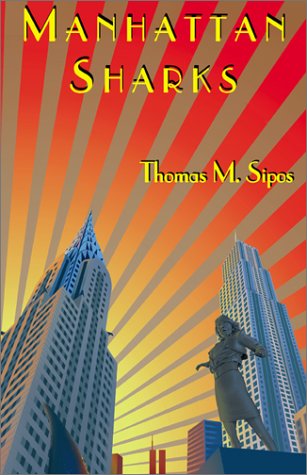|
One of the great failings
of contemporary conservatives is their inability to deal with the dangerously
narcotic effects of wealth and privilege. [Sipos] not only addresses
this failure, but does so with a brilliantly twisted sense of humor.
Manhattan
Sharks is the most hilarious American novel I've read this year. I can say this in all honesty: If you have ever suffered through the topsy-turvy
world of job interviews, if you have ever found yourself trapped in the
cloistered cubicles of America's bureaucratic businesses, and if you lived
through the 1980s (and can remember them), then you must read this book. Stocked with colorful characters, using absurd situations, and employing
a well-choreographed plot, Manhattan
Sharks is an entertaining and insightful parody of modern American
mores.
-- Derek Copold, The Houston Review, August 26, 2001
What will life be like after
graduation? How will you prepare for the big job interview? What is the difference between a charcoal gray suit and a gunmetal gray
suit, and why does it matter? Manhattan
Sharks answers these questions and more in a satirical look at careers
and daily life in 1983 in New York City.
It is hard to summarize the plot,
since there does not appear to be one upon cursory examination. Dig
deeper, however, and it is not just a story of job hunting and corporate
ladder climbing. It is a story of friendship, romance, and the search
for the perfect résumé.
Sipos tells the story in vignettes,
and it is sometimes hard to follow where he leads. Nevertheless,
the reader quickly adjusts to the somewhat choppy narrative style and becomes
engrossed in the stories. The characters are somewhat tough to like,
but they are always realistic and believable. Funny and entertaining.
-- Sarah Burney, Carolina
Review, December 2001 |
A satire
of corporate life and personal greed in 1980s New York City, specifically
during the sweltering summer of 1983. It is an amusing work with
clever period details and phrasing. The villain is a former hippie
who has turned into a consumerist yuppie but still holds all the appropriate
"progressive" opinions on topics such as gun control. The observation
that most yuppies were fiscally conservative but socially liberal is still
not exactly commonplace today, and Sipos's book brings this point home
forcefully. Many liberals have latterly envisioned the 1980s in the
United States as a uniformly archconservative Decade of Greed, but Sipos
adeptly implicates them in the mess by repeatedly rejecting conventional
ideas of class and politics.
-- Mark Wegierski, American
Outlook, Winter 2002
At times humorous, at other times
satirically somber, Manhattan
Sharks follows the quotidian trials of Henry Willoughby, a recent college
graduate thrust uncertainly into the early 1980's New York City labor market. Henry's plight is contrasted with several other characters directly or
indirectly connected to his low-level job as a TV ratings analyst in Manhattan,
a place repeatedly characterized in the book as shark-infested. With
one exception, however, none of the novel's characters is a "shark" at
all. Like Chuang Tse's butterfly that may be dreaming he is a man,
most of the characters in Henry Willoughby's world are guppies dreaming
they are apex predators, or harboring dreams of becoming one.
The sea in which these schoolfish
swim is actually an ocean of upward mobility, a social eco-system into
which they are the first generation born. This was a new economy,
in no small part the product of Reagan administration policy initiatives
and efficiency gains in industry that created excess wealth. It is
also an environment these children of relative privilege only think they
understand, one whose rules have been inchoately learned by them through
the filter of institutions hostile to the values and attitudes needed to
navigate these uncharted waters.
The combination of wide-eyed idealism
and abstract, impractical education found in Sipos' characters results
in a comical mix of self-pity, apathy, neuroses and delusion. What
almost all these characters have in common is that each of them fails to
realize what they lack and, even more tragically, what they want. Their
goals have been defined by others, as have their self-images.
Well-written, fast-paced, and
unapologetically caustic in its humor.
--
Hank Schwaeble, Midwest
Book Review, May 2002 |

